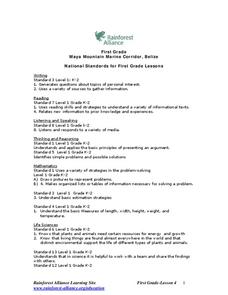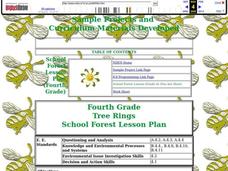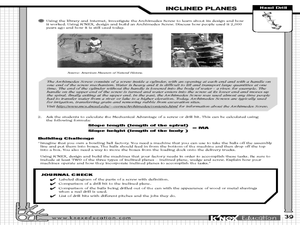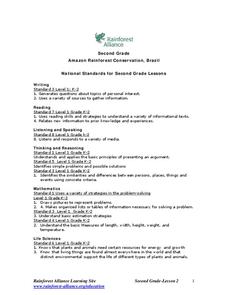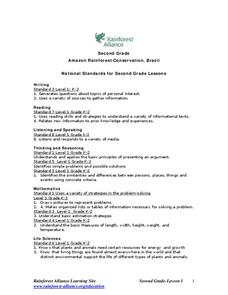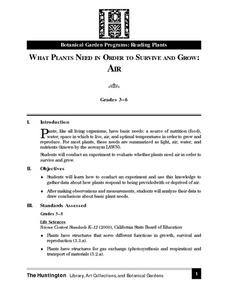Curated OER
Who Takes Care of the Maya Forest Corridor?
First graders study the animals in the Maya Forest Reserve. In this conservation lesson plan, 1st graders create a graph to compare the environment of animals to their own. They design a 3D model of these two environments.
Curated OER
What Plants Need in Order to Survive and Grow: Light
Students conduct an experiment to evaluate whether plants need light to survive and grow. They observe and gather data about plant responses to different growth regimes, analyze the data, and make conclusions about basic plant needs.
Curated OER
What Plants Need in Order to Survive and Grow: Soil
Students conduct an experiment to evaluate whether plants need soil to survive and grow. They plant two seeds, one with soil and one without, make predictions, and record and analyze the seed germination results on a worksheet.
Curated OER
Plant Growth
First graders investigate how seeds are moved and how plants grow. For this plant growth lesson, 1st graders listen to stories, play a game, and view a PowerPoint about plant growth. Students examine various seeds and recognize how they...
Curated OER
Tree Rings
Fourth graders explore tree rings. In this plant biology lesson plan, 4th graders construct a KWL chart on tree rings and examine real tree rings. Students identify the changes that happened during the tree's life and its actual age....
Curated OER
The Hand Drill: An Example of a Screw
Students examine how a screw works as an inclined plane and a hand drill works as a screw. In this physics lesson, students complete two hands-on activities working with simple machines including screws and hand drills. This lesson...
Curated OER
Amazon Rainforest Conservation, Brazil
Students explore the concept of understanding the effects of disturbances in an environment. In this life science lesson, students use the game Jenga to help capture the idea of environment disturbances. Students discuss the effects of...
Virginia Department of Education
Weather Patterns and Seasonal Changes
Get your class outside to observe their surroundings with a lesson plan highlighting weather patterns and seasonal changes. First, learners take a weather walk to survey how the weather affects animals, people, plants, and trees during...
Curated OER
Inside the Egg, Hatching Chickens
Pupils conduct an egg candling activity to show the life inside a fertile egg. Students discuss the needs the egg has of the hen, as well as similarities and differences between plants and animals. Pupils complete a life cycle wheel...
Curated OER
A Rainbow Under the Sea: How Do Animals Survive in the Ocean?
Second graders, with adult help, create a PowerPoint presentation on a selected ocean animal.
Curated OER
Vermicomposting
Fourth graders explore insect life by viewing a soil presentation in class. In this composting lesson, 4th graders read assigned text about the process of composting soil and the necessity of soil in plant life. Students view video clips...
Curated OER
School Forest
Sixth graders explore the concept of biodiversity. In this biodiversity lesson, 6th graders discover a variety of planets and animals that live in forests, and how a rotting log benefits that environment. Students also locate seven...
Curated OER
Garbage Plants
Students create plants out of garbage. They identify items that can be recycled and discuss natural resources. They share their creation with the class.
Curated OER
Living vs. Nonliving
Young scholars explore the characteristics that distinguish living things from nonliving things. Students examine video clips and still photographs to gather evidence and develop criteria to decide if something is living or nonliving.
Curated OER
Making Cents of the Senses
Students explore sight and hearing. In this senses lesson, students read Brown Bear Brown Bear, discuss how eyes are used for sight, and chart the eye color of the students in the class. Students discuss how hearing is important, take a...
Curated OER
Amazon Rainforest Conservation, Brazil
Students explore rain forests. In this rain forest lesson, students participate in a "BioBlitz" of their schoolyard, observing and recording every living thing in a designated area. Students visit websites about rain forests to...
Curated OER
Characteristics of Snakes and Turtles
Students examine the characteristics of snakes and turtles and compare/contrast reptiles with mammals. They watch a video, answer discussion questions, complete information charts, conduct Internet research, and create a habitat diorama.
Curated OER
Allelopathy Experiments
High schoolers explore how allelopathy works in plants. In this botany lesson, students explain how this phenomenon affect other organisms. They read and analyze an article about allelopathy and discuss its flaws.
Curated OER
What Plants Need in Order to Survive and Grow: Air
Students conduct an experiment to determine whether plants need air in order to survive and grow. They discuss natural resources, analyze slides, and observe and record data from the experiment.
Curated OER
Learning About Plants- Flowers for a Special Occasion
Students explore the parts of plants and discover that plants need to grow. In this plant lesson plan, students discuss the parts of the plant and plant petunias. Students can share their plants with friends or families.
Curated OER
Adaptable Mandibles
Students define adaptation and highlight example of adaptation in birds and other animals. They study feeding techniques of seabirds and investigate the effect that trash has on wildlife.
Curated OER
Mellowing With Age, A Closer Look
Students realize that aging is a "natural, continuous process" and develop sensitivity to the needs, desires, and capabilities of the elderly by interviewing elderly community members and photographing age related things.
Curated OER
How Does a Green Plant Grow?
Students of all ages can explore the question "how do seeds grow?", design an experiment to answer the question, predict the outcome of the experiment then conduct the experiment.
Curated OER
Learning From Leaves: Adaptations To Differing Light Levels
Students, in groups, examine plants with different light levels. They are given plants from a tropical and desert region. They write a hypothesis at the beginning of the experiment.


